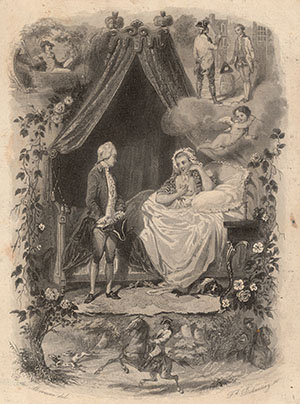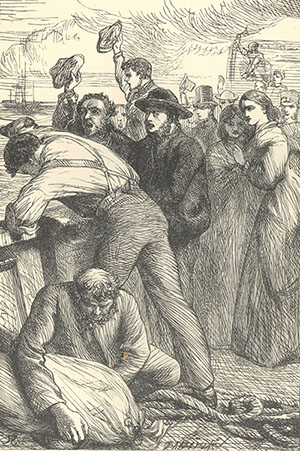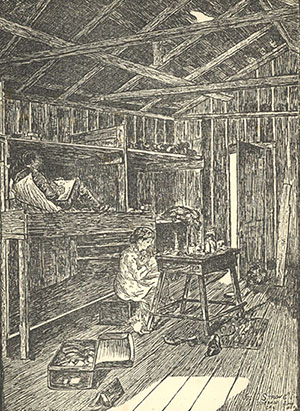
Travels in America and Italy, Vol. 1
By Francois-Rene de Chateaubriand (1828)
Chateaubriand, father of French romanticism, may not have explored all the parts of America that he claims—but so what? He tells a great yarn.
Disillusioned by the French Revolution, the young aristocrat quits the army and comes to the United States in 1791, intending to find the Northwest Passage, a task he quickly realizes is beyond him. A career in literature and diplomacy later, a more seasoned Chateaubriand publishes a colorful memoir of his youthful expedition.
En route leaping into the Atlantic for a dip that leads to a close encounter with sharks, he arrives at Chesapeake Bay. He (supposedly) dines with George Washington; of the ostensible meal, he writes, “I have felt myself warmed by it for all the rest of my life.” Managing not to tumble into the falls of the Niagara River, the flaneur sees parrot flocks “plunder the fields” along the Ohio and other wonders. He descends the Mississippi, where buffalo bound among the reeds. On the shores of a crystal-clear Florida lake, he explores mysterious ruins where even “brute animals” behold the sunset as “the crocodile, turned towards the luminary of day, spouted from his open mouth the water of the lake in coloured jets.” The author’s observations about Native American Indian customs deserve a skeptical read. Critics maintain that Chateaubriand extrapolated them from contemporaries’ accounts. These continue in Volume 2, which includes a record of his travels in Italy as well.
The Archive.org version includes a 78-page “sketch” of travels throughout history. A 1965 Journal des Savants essay—en Francais—challenges many of the author’s claims.
✯✯✯✯✯
American Notes for General Circulation

By Charles Dickens (1842)
England’s foremost 19th-century author deplores Americans’ filthy habits, such as chronic spitting on the floor—even in Congress. Dickens unmasks fraudulent business practices and reviles a corrupt press, calling out the young nation on multiple hypocrisies.
Famous at home for using fiction to expose his homeland’s injustices, Dickens receives privileged access almost everywhere in the New World. He sees much bad, but acknowledges the good, such as American benevolent organizations, especially in the Northeast. A school for the deaf, a hospital for the insane, and an asylum for the poor all run on enlightened principles, he reports.
But in American commerce, watch out. “The love of ‘smart’ dealing … gilds over many a swindle and gross breach of trust … and enables a knave to hold his head up with the best, who well deserves a halter,” Dickens writes.
Served food by slaves in Maryland, the author sets a westerly course, though he takes care to quote 44 newspaper advertisements that reinforce his aversion to the South. Samples: “Ran away, Negress Caroline. Had a collar on with one prong turned down”…“Ran away, my negro man named Simon. He has been shot badly, in his back and right arm.”
Project Gutenberg offers a free e-book of the 1915 edition, or read it in your browser.
✯✯✯✯✯

The Silverado Squatters
By Robert Louis Stevenson (1883)
Unwell and intent on escaping coastal California’s “poisonous” fogs, Scotland-born Robert Louis Stevenson, an aspiring writer, packs up his American bride, her 12-year-old son, and their dog, leading them inland on a Napa Valley honeymoon in 1880.
While he and his little clan squat in the dilapidated remains of an abandoned silver mine called “Silverado,” Stevenson makes notes on the place and events there said to inspire parts of his 1882 novel, Treasure Island. A bunkhouse the family adapts as a cottage has floors covered in dirt and gravel “sifted in there by the mountain winds. The room immediately above could only be entered by a plank propped against the threshold, along which the intruder must foot it gingerly, clutching for support to sprays of poison oak.” Doors hang smashed or don’t exist. Among other interruptions to an otherwise idyllic interlude on the slope of Mount Saint Helena, disreputable neighbors blame missing knives on “wild cats” and enlist Stevenson in a scheme to purloin the mining claim. Rattlesnakes aren’t an issue—until they are.
As to whether Silverado produced half a million in precious metal before “the ledge pinched out” or actually was a beard for smugglers, as he has heard, Stevenson gets a clue when a kid-gloved gent comes “debauching past the house” looking “in that place like a blasphemy.” Does the owner let the Stevensons stay, and will he wise up to the plan to pirate the claim? To find out, download the free Project Gutenberg e-book or read it in your browser.✯
—“Looking Backward” marks the debut of Amanda Miller’s online column on American History. Miller is a 20-year-veteran journalist with a background in history and English.

